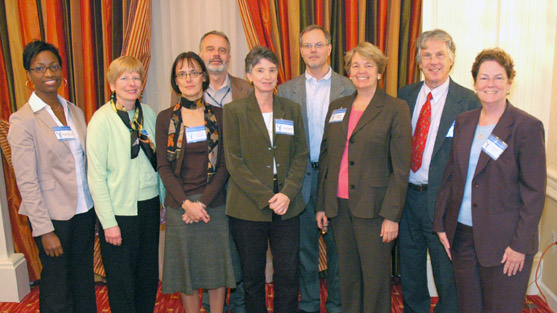Cohort Consortium Annual Meeting
Large-Scale Collaborations Making A Difference
The NCI Cohort Consortium
(CoCo) held its most recent annual meeting, hosted by the Division
of Cancer Control and Population Sciences (DCCPS)
and Division of Cancer Epidemiology and
Genetics (DCEG),
in November 2007 in Bethesda, MD. The meeting spotlighted the research
of many investigators who are supported through the DCCPS Epidemiology
and Genetics Research Program (EGRP), which manages NCI’s cancer
epidemiology grant portfolio.
NCI formed CoCo in 2000 to address the need
for large-scale collaborations in order to have sufficient data and biospecimens
to study gene-gene and gene-environment interactions in the etiology of
cancer. Its membership now numbers 33 cohorts from 12 countries with 4
million study participants. Pre-diagnostic biologic specimens are available
for about 2 million of these study participants. CoCo has launched multi-cohort
studies of more than ten forms of cancer using questionnaires, DNA, and
serum samples.
More than 100 scientists working on cohort studies attended
the meeting that included keynote talks by Robert
Croyle, Ph.D., DCCPS
Director, on “NCI Update and Perspectives” and Joseph
F. Fraumeni, Jr., M.D., DCEG Director, on “Consortial Power
and GWAS in 2007.”
Extraordinary
Year for Prostate Cancer Research
Secretariat member Michael J. Thun, M.D.,
American Cancer Society, moderated a lively session on recent advances
in prostate cancer generated by the EGRP-funded Breast
and Prostate Cancer Cohort Consortium (BPC3) and the NCI
Cancer Genetic Markers of Susceptibility (CGEMS)
project. Stephen J. Chanock, M.D., Director of the NCI Core Genotyping
Facility and Chief of the DCEG Laboratory of Translational Genomics, shared
highlights of the discovery of the association of genetic variation in
chromosome 8q24 and prostate cancer together with panelists Fredrick Schumacher,
Ph.D., Harvard School of Public Health, Christopher Haiman, Sc.D., University
of Southern California, and Richard B. Hayes, D.D.S, Ph.D., DCEG, who discussed
the extraordinary year in prostate cancer genetics research and proposed
future directions.
Robert N. Hoover, M.D., Sc.D., DCEG, led a panel discussion
on the numerous major advances in breast cancer to emerge from BPC3 and
CGEMS during the year, with presentations by Peter Kraft, Ph.D., Harvard
School of Public Health, David Cox, Ph.D., Harvard School of Public Health,
Heather Feigelson, Ph.D., American Cancer Society, and Brian Henderson,
M.D., University of Southern California.

CoCo leaders, left to right: Chinonye Harvey, M.P.H., NCI Epidemiology and Genetics Research Program (EGRP),
Division of Cancer Control and Population Sciences (DCCPS); Kathy Helzlsouer,
M.D., Johns Hopkins
Bloomberg
School of Public Health; Anne Zeleniuch-Jacquotte,
M.D., New York University; Robert N. Hoover, M.D., Sc.D.,
NCI Division of Cancer
Epidemiology and Genetics (DCEG); Julie Palmer, Sc.D., Boston University;
James
Cerhan, M.D., Ph.D., Mayo Clinic; Patricia Hartge, M.A., Sc.D., NCI DCEG;
Michael
J. Thun, M.D.,
American Cancer Society; and Deborah Winn, Ph.D., NCI EGRP Acting
Associate Director.
Not pictured Geoffrey Tobias, NCI DCEG. Attention to Less Common Cancers
In 2007, CoCo launched a series of studies of less common cancers which
were described in a discussion session moderated by outgoing Secretariat
member Kathy Helzlsouer, M.D., Johns Hopkins Bloomberg School of Public
Health. Rachael Stolzenberg-Solomon, Ph.D., DCEG, gave an update on the
genome-wide association study in pancreatic cancer
(PanScan),
Graham Colditz, M.D., Dr.P.H., Washington University, discussed multiple
myeloma, and Virginia Hartmuller, Ph.D., R.D., EGRP, and Lisa Gallicchio,
Ph.D., Mercy Medical Center, Baltimore, MD, presented an update on a pooled
analysis from the BPC3 cohorts measuring pre-diagnostic serum vitamin D
samples to determine whether low levels of the vitamin are associated with
increased risk of seven less common cancers. EGRP supports PanScan and
the Vitamin
D research projects.
Secretariat member Julie Palmer, Sc.D., Boston University, chaired a
panel discussion on methodologic topics including study design issues,
presented by Clarice Weinberg, Ph.D., National Institute of Environmental
Health Sciences (NIEHS); methods for assessing dietary intake in epidemiologic
studies, presented by Arthur Schatzkin, M.D., Dr.P.H., DCEG, and Amy Subar,
Ph.D., R.D., DCCPS; whole-genome amplification of buccal cell DNA, presented
by Montserrat García-Closas, M.D., Dr.P.H., DCEG; and the use of
Medicare/Medicaid databases for ascertainment of non-cancer outcomes, presented
by Secretariat member James Cerhan, M.D., Ph.D., Mayo Clinic.
Secretariat
member Anne Zeleniuch-Jacquotte, M.D., New York University, and Deborah
Winn, Ph.D., EGRP Acting Associate Director, led a discussion of major
challenges faced by cohorts in the consortium studies. The final session
of the meeting focused on evaluation of ten promising new proposals for
consortial studies and development of a strategic plan.
Looking Ahead in
the Cohort Consortium
The major goals for the Cohort Consortium in 2008
are to: 1) continue support for the major ongoing projects; 2) foster additional
Genome Wide Association Studies in other uncommon cancers and relevant
subpopulations, such as African-American men; 3) launch a large analysis
(e.g. BMI and cancer risks) from questionnaire data; 4) explore alternative
ways to fund cohort infrastructure maintenance; 5) continue to develop
methods for “newer” cohorts and those in the field; 6) Continue
to foster new opportunities for consortial projects; 6) develop liaisons
with other consortia; and 7) enhance statistical advice across projects.
Patricia Hartge, Sc.D., is Cohort Consortium Secretariat Chair
(2007-2008). Chinonye (Nonye) Harvey, M.P.H., EGRP, is Consortium Coordinator.
Geoffrey Tobias, DCEG, is Consortium Executive Secretary. Members of
the Cohort Consortium Secretariat are: Drs. James Cerhan, Robert Hoover,
Julie Palmer, Michael Thun, Deborah Winn, Anne Zeleniuch-Jacquotte.
|

